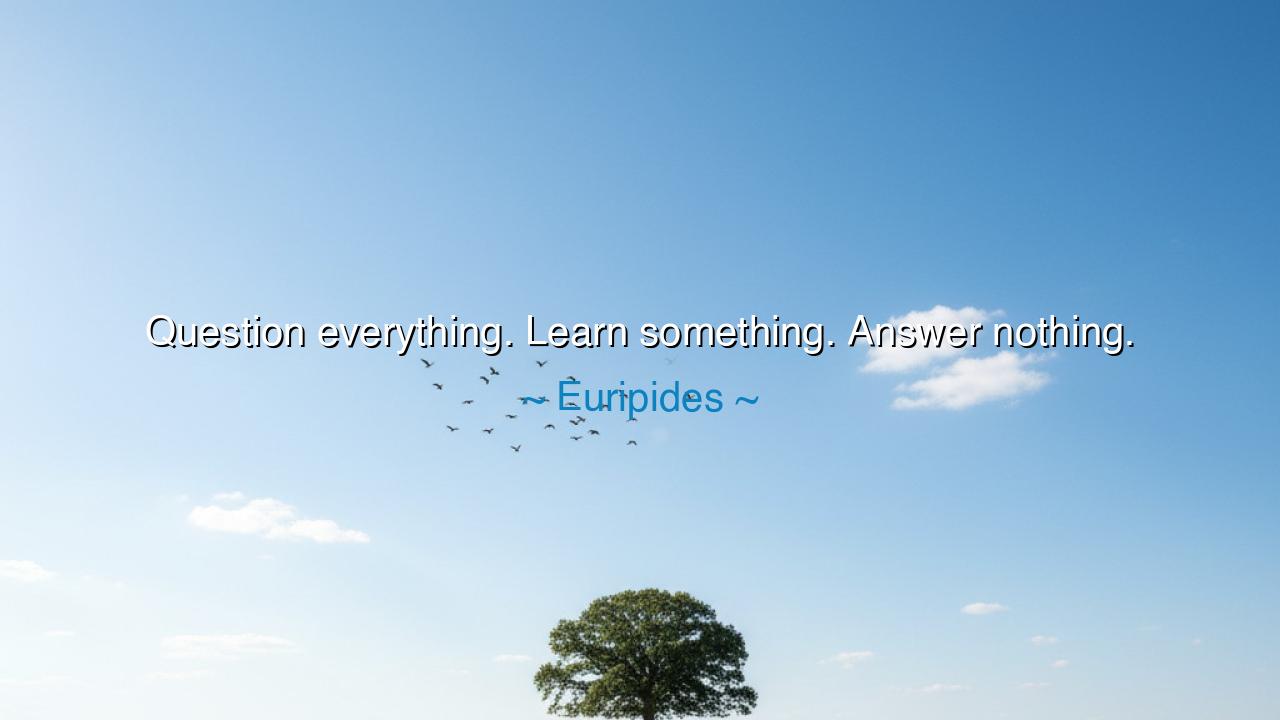
Question everything. Learn something. Answer nothing.






The great dramatist Euripides, the restless mind among the tragedians of ancient Greece, once declared: “Question everything. Learn something. Answer nothing.” In this triad of wisdom lies the very spirit of philosophy—the eternal flame of inquiry that has burned in the hearts of thinkers, prophets, and poets since the dawn of reason. To question everything is to refuse the blindness of certainty; to learn something is to embrace the humility of truth; and to answer nothing is to honor the mystery that lies beyond the reach of human pride. These are not words of doubt, but of awakening—an invitation to walk the path of wisdom not as a master, but as a seeker.
To question everything is to rebel against the comfort of ignorance. It is to refuse the easy answers handed down by tradition or authority and to ask, “Why?” and “How?” and “What if?” In this act of questioning lies the birth of all progress. The philosophers of Athens questioned the nature of justice and the gods; the scientists of later ages questioned the nature of the heavens and the earth. Every discovery—every act of human growth—begins with this sacred doubt. Yet such questioning requires courage, for to ask sincerely is to risk the crumbling of what one believes. The coward accepts what he is told; the wise man dares to seek what is.
When Euripides wrote these words, he lived in an age of conflict between tradition and reason. The old myths were fading, and the gods themselves seemed to tremble under the scrutiny of human thought. His plays, often accused of impiety, were not acts of rebellion but of searching. He questioned why men fought, why women suffered, why fate ruled over justice. To his people, these questions were dangerous—but to Euripides, they were divine. For he knew that questioning is not the destruction of truth, but its purification. Every falsehood must be tested by the fire of inquiry before the pure gold of understanding can emerge.
To learn something is the fruit of such questioning. But Euripides, ever the realist, does not say “learn everything”—for knowledge is infinite, and the human mind, though luminous, is small. Instead, he urges the seeker to learn something—something real, something deep, something that transforms the soul. It is not the multitude of facts but the depth of insight that nourishes wisdom. To learn even one truth deeply and humbly is to touch eternity. The man who learns without understanding is like one who drinks without tasting; he quenches nothing but his vanity.
And what of answer nothing? This is the most mysterious command of all, and yet the most profound. It does not mean silence born of ignorance, but silence born of reverence. For once a man has questioned deeply and learned truly, he realizes how vast the unknown remains. To “answer nothing” is to refuse arrogance—to stand before the mysteries of existence and bow in awe. It is the wisdom of Socrates, who said, “I know that I know nothing.” The wisest among men do not speak in certainties, for they have glimpsed the infinite, and they know the limits of their own minds.
History gives us a shining example in Galileo Galilei, who gazed upon the heavens and dared to question everything that the scholars of his day believed. Through the telescope he learned something—that the Earth was not the center of creation but a humble traveler among the stars. Yet when the powers of his age demanded he recant, Galileo held his silence, embodying the spirit of answer nothing. For he knew that truth does not need to shout; it endures quietly, awaiting the dawn when others will finally see. His humility, his restraint, and his courage became the pillars upon which the modern world of knowledge was built.
Thus, Euripides teaches us that wisdom is not loud or boastful—it is patient, curious, and humble. To question everything is to awaken; to learn something is to grow; and to answer nothing is to remain open to the endless mystery of existence. The fool believes he knows; the wise man forever seeks. Those who follow this path will never stagnate, for they will always be learning, always moving closer to truth, yet never presuming to own it.
So take this as your lesson: live as a seeker, not as a preacher. Question the world around you—its customs, its beliefs, even your own heart. Learn deeply, but wear your knowledge lightly, as one carries a lantern, not a crown. And when others demand final answers, smile with the serenity of Euripides, and answer nothing. For silence, born of wisdom, speaks louder than all the noise of certainty. To live this way is to walk forever in wonder—and in that wonder lies the beginning of all wisdom.






AAdministratorAdministrator
Welcome, honored guests. Please leave a comment, we will respond soon